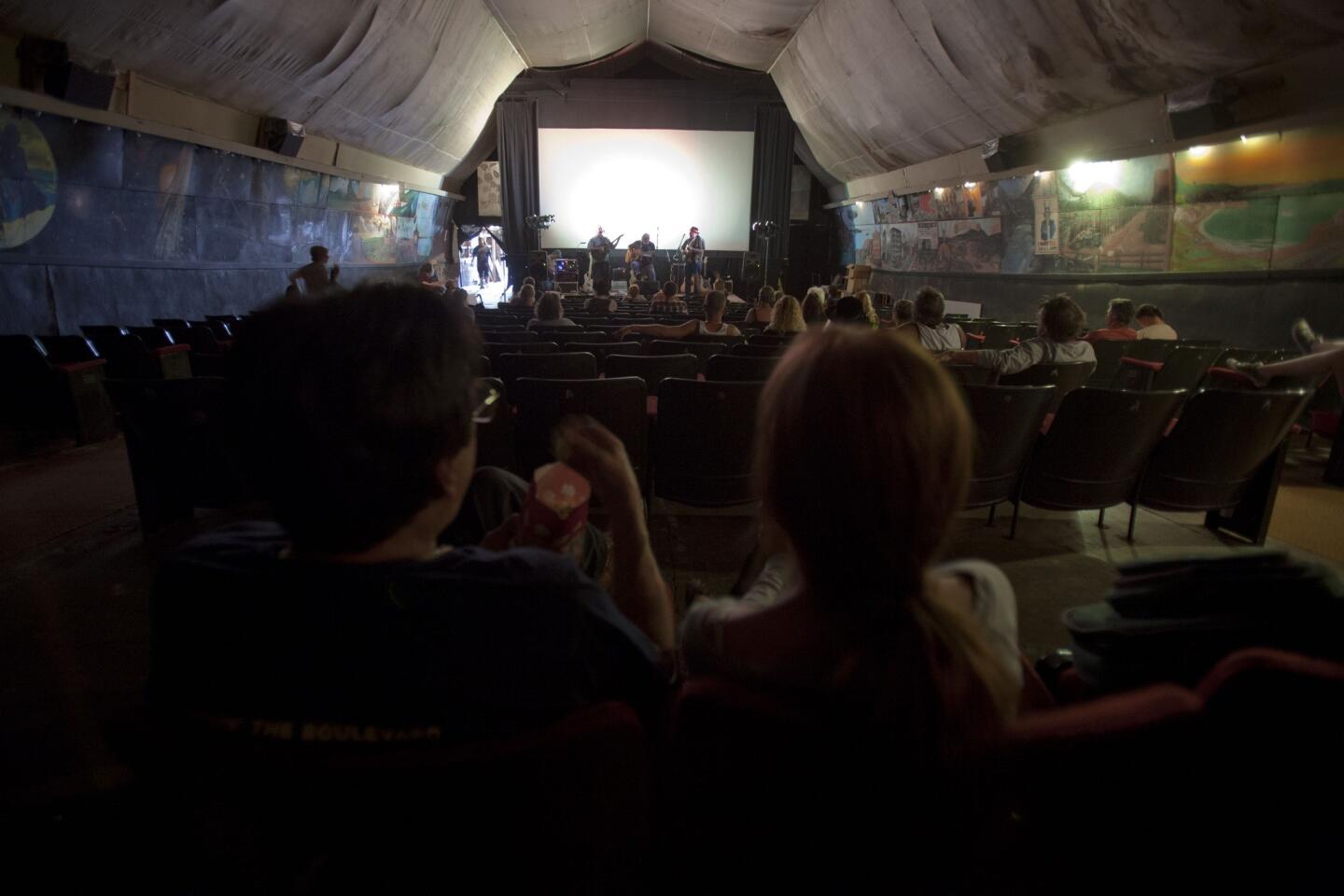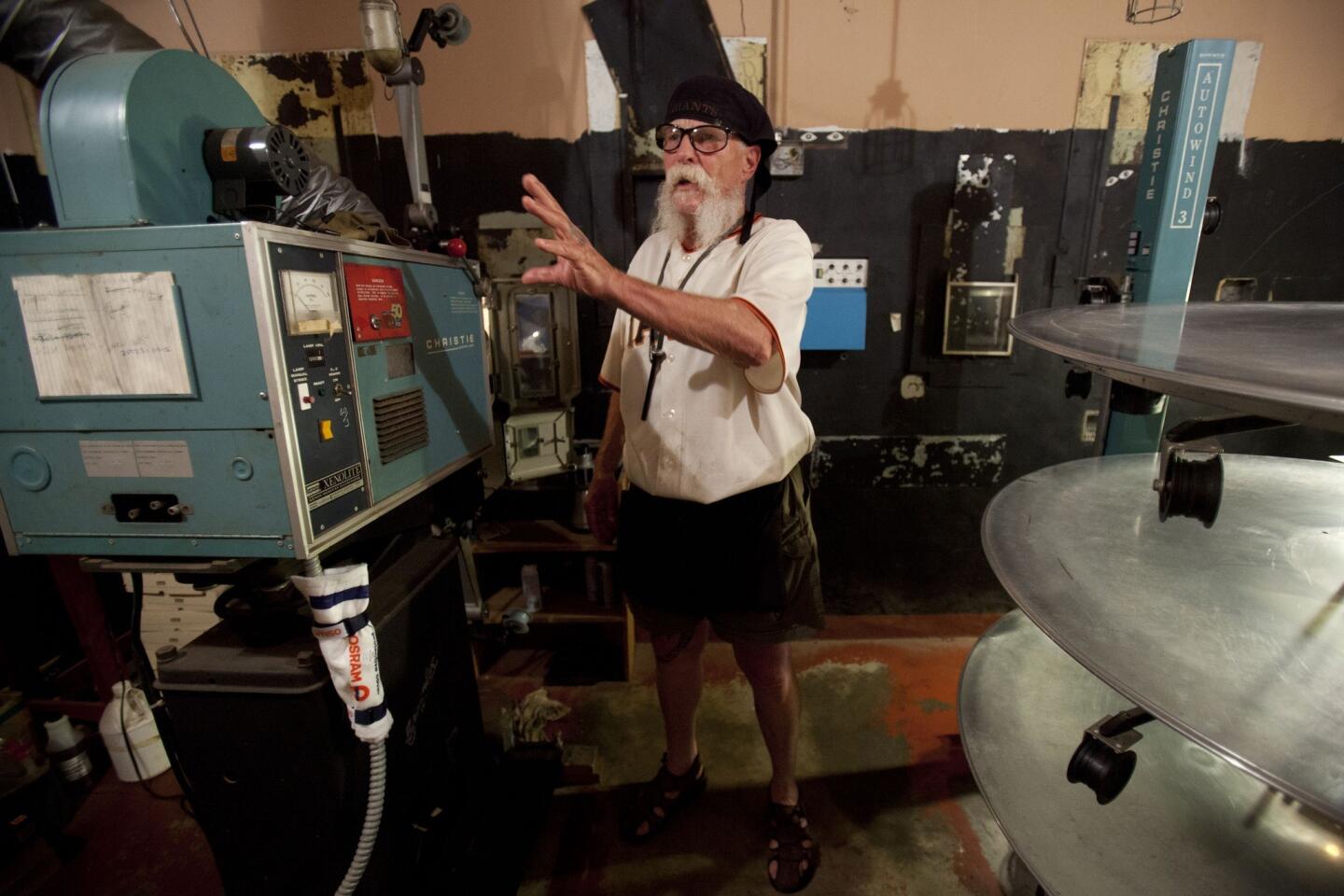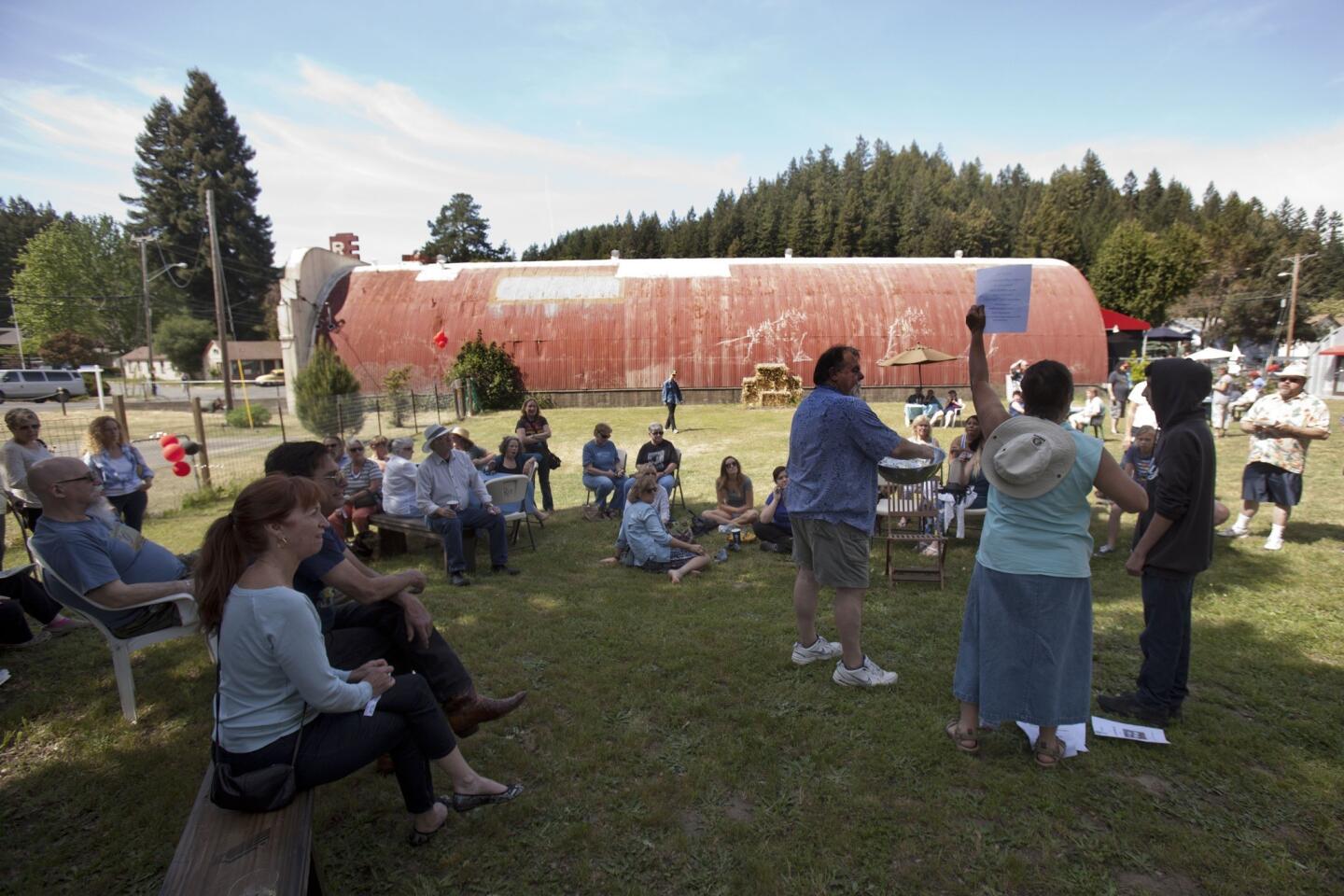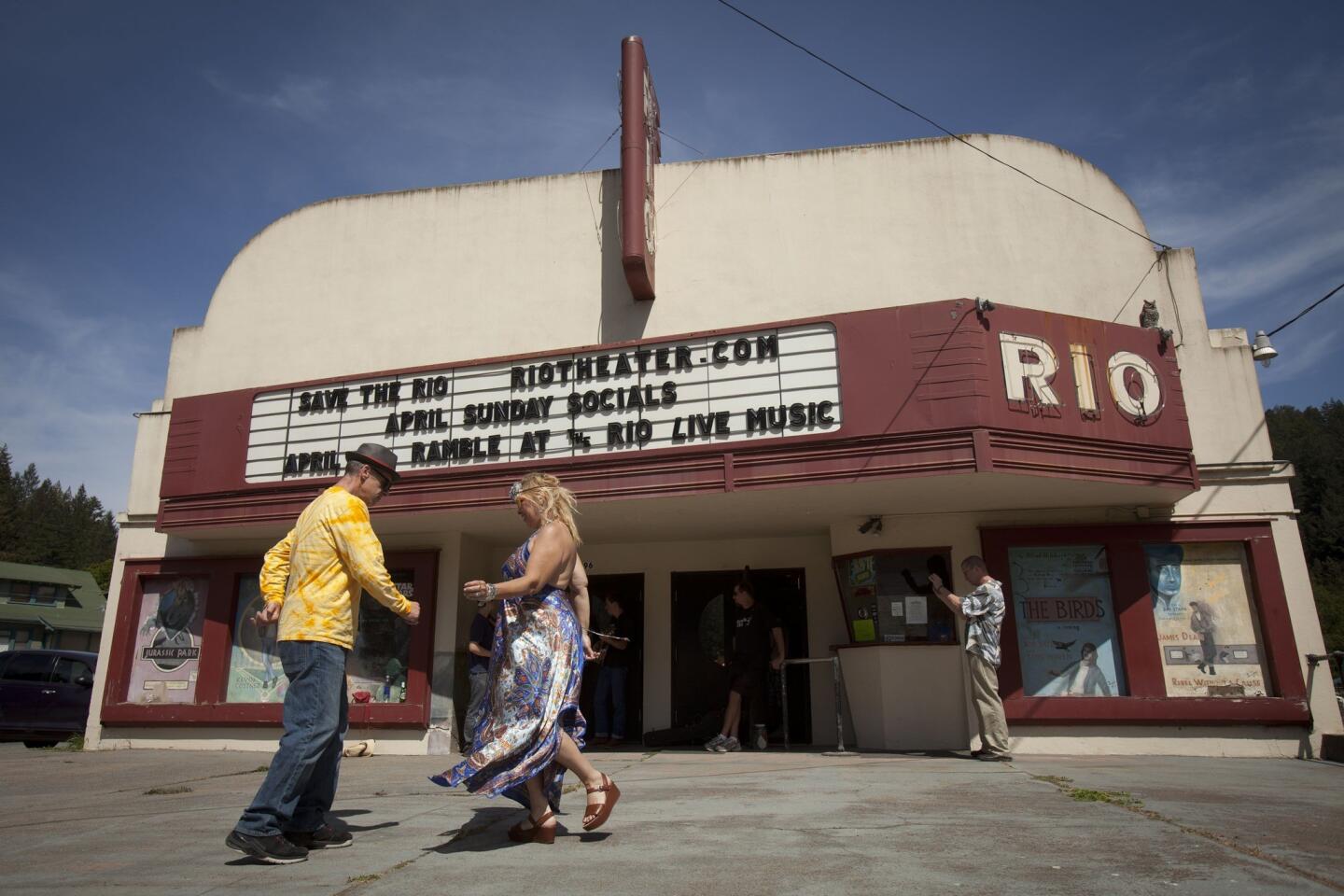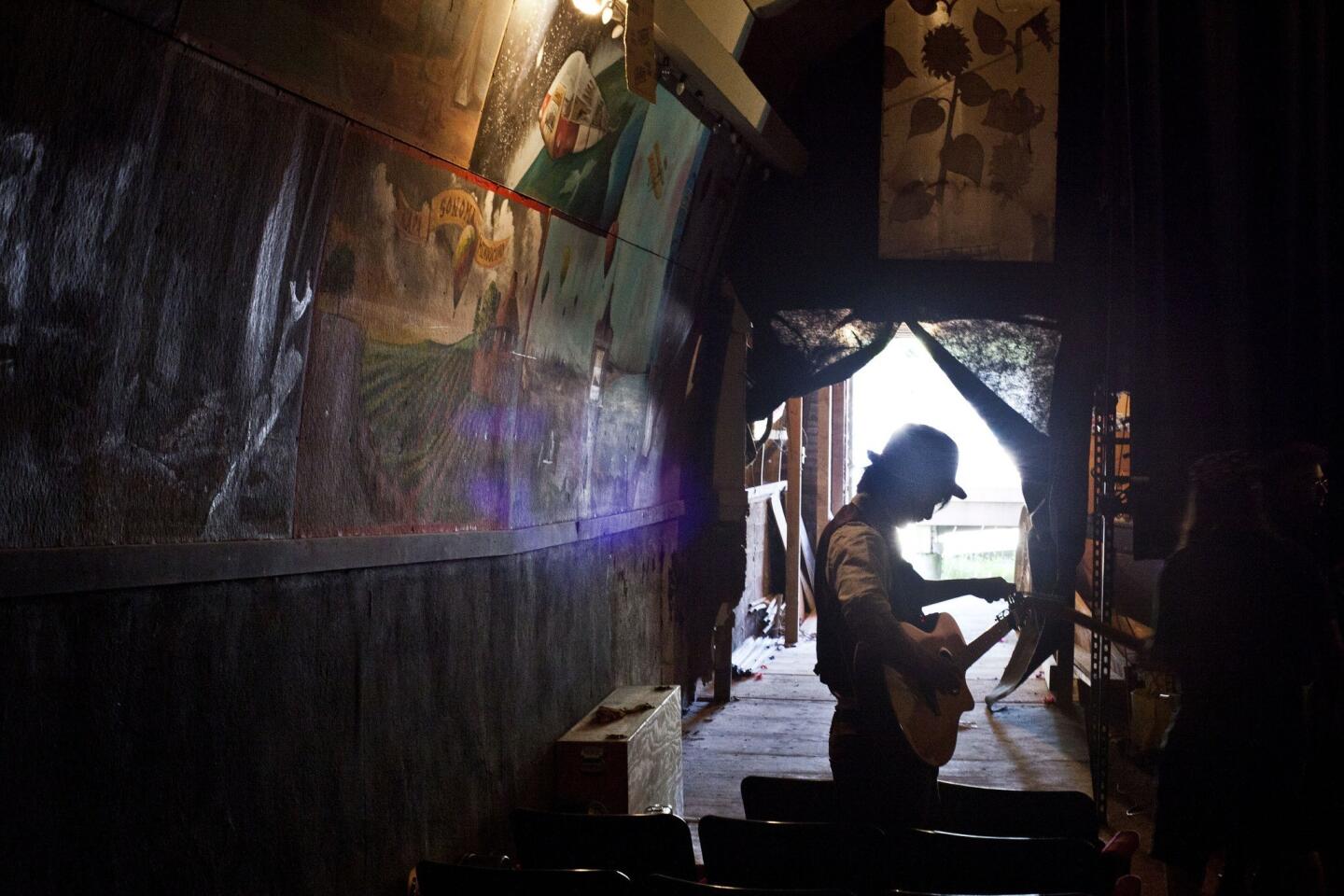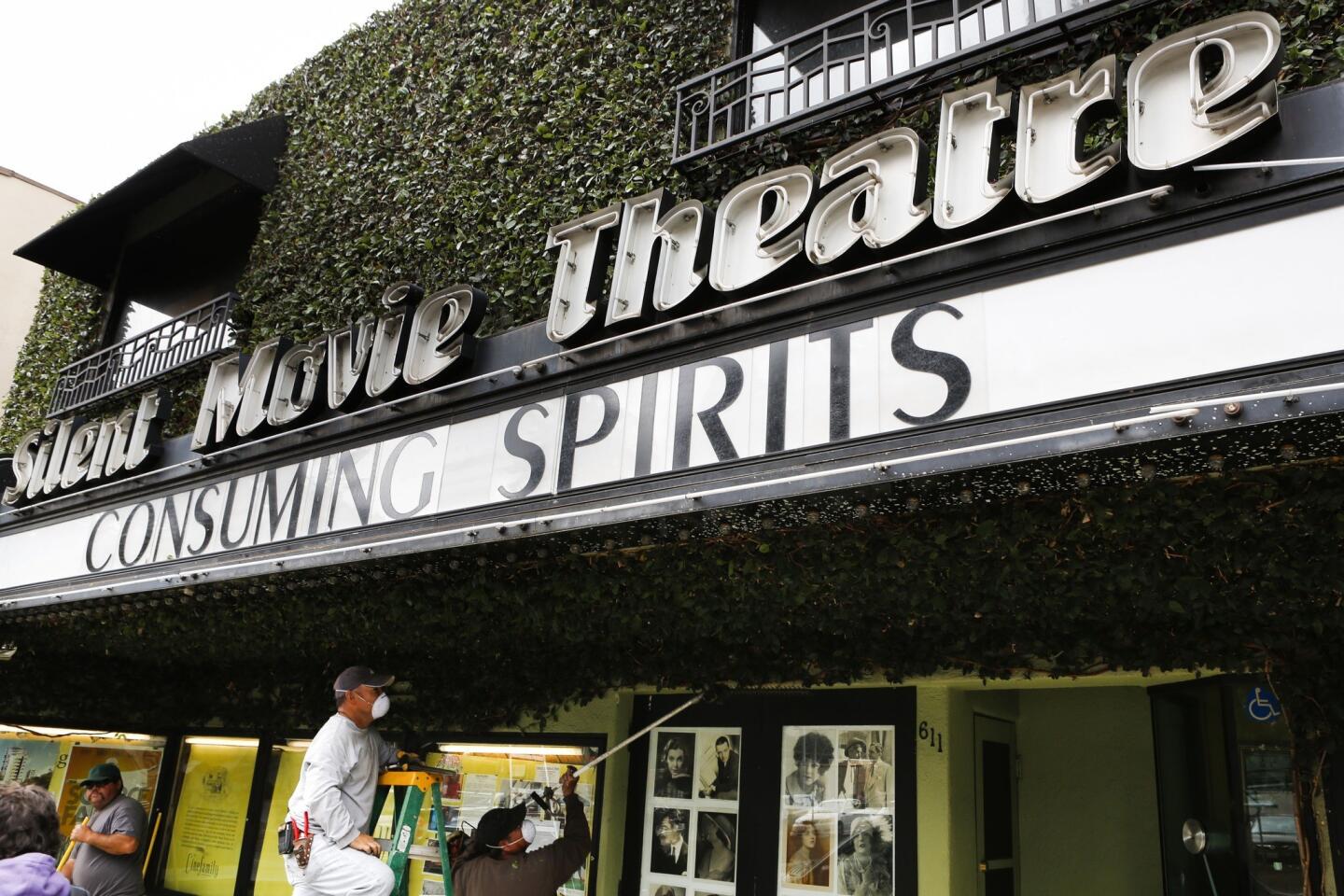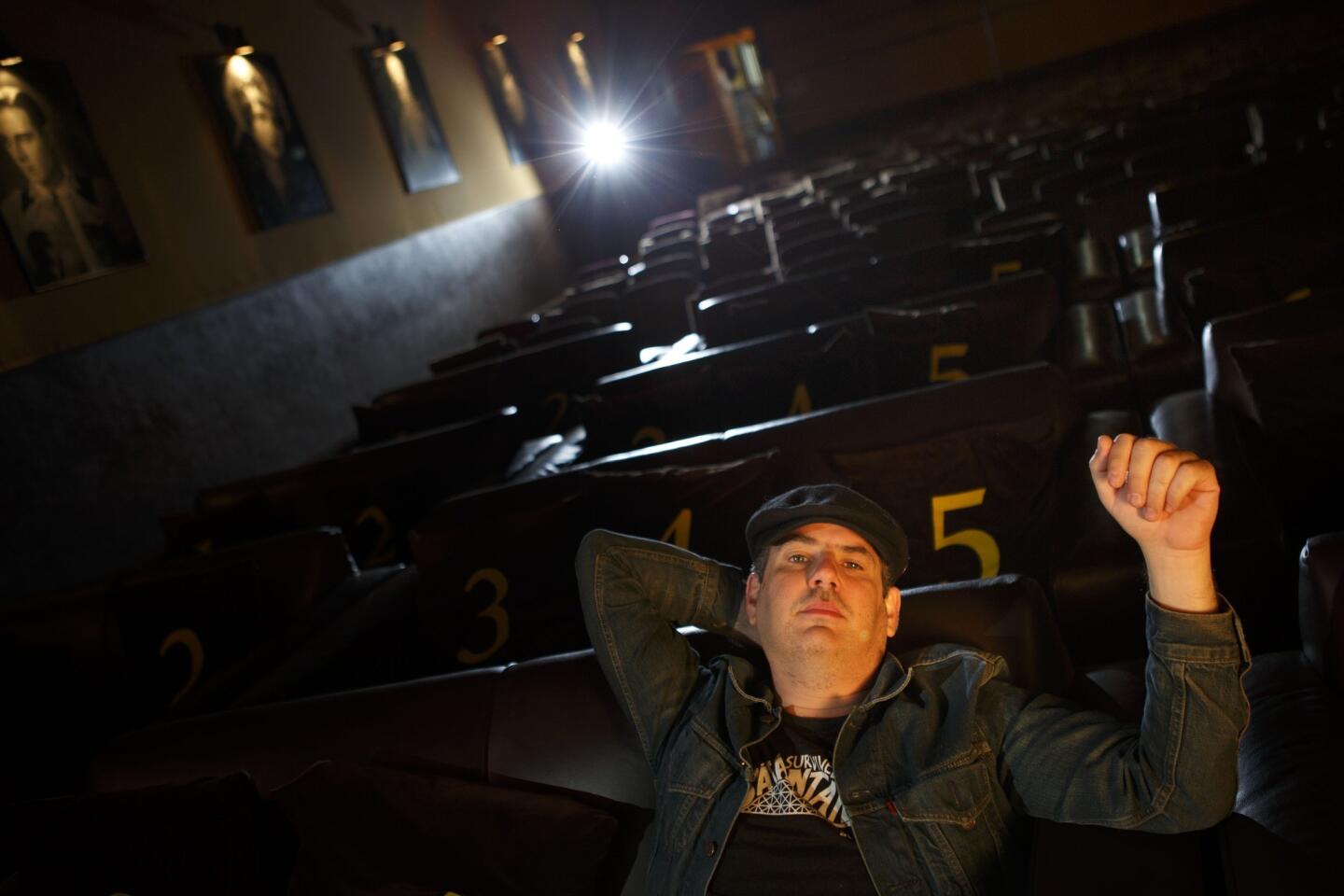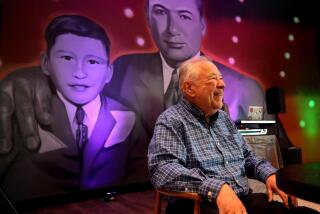Small-town movie theaters threatened by shift to digital cinema
- Share via
MONTE RIO, Calif. — On the redwood-lined banks of the Russian River, dozens of local residents and tourists gathered in a grassy field on a hot Sunday afternoon, lining up to buy raffle tickets and $10 plates of barbecued chicken as a bluegrass group rehearsed a number for a Ramble at the Rio concert.
It might have been a church social or a school fundraising picnic. But this event was to raise money to save a centerpiece of the community: the Rio Theater.
Built from a World War II Quonset hut and adorned with murals from local artists, the Rio has been screening films in this town of about 1,200 people since 1950. Located in the wine country north of San Francisco off the Bohemian Highway, a few miles away from the Bodega Bay filming location of Alfred Hitchcock’s classic “The Birds,” the Rio has survived fires, floods and multiple owners.
But it may not survive the latest threat — the digitization of the film industry. By the end of this year, Hollywood’s major studios will stop delivering film prints to movie theaters, replacing them with cheaper digital hard drives.
The owners of the 230-seat Rio didn’t have the $60,000 required to upgrade to digital projection. So they’re asking their community to raise the money to help cover the cost, using Sunday fundraisers and the crowd-funding site Kickstarter to save them from extinction. These days the theater’s vintage marquee is emblazoned with the words “Save the Rio.”
“If this place goes down, it will be like a ghost town,” said resident Leslyn Dooley, working the barbecue stand with her husband, who runs a local plumbing business.
Similar benefits and special events are happening in small towns across America as communities rally to preserve hometown theaters that are holdovers from a bygone era.
The major national and regional circuits have already converted most of their multiplexes to a digital format. Most got help from the movie studios, which helped subsidize the purchase of new digital equipment using so-called virtual print fees. More than 85% of the U.S.’ 4,044 theaters, representing 34,161 screens, have gone digital, according the National Assn. of Theatre Owners trade group.
But about 1,000 theaters, mostly single-screen, small-town, family-owned operations, are still relying on film projectors. Many of them are struggling because of competition from big chains and more entertainment options in the home.
Some can’t afford to buy the equipment or don’t want to assume debt. Still others did not anticipate the rapid pace of the digital rollout, which began five years ago.
“When you have a business and technology that has always worked for you, it’s hard to imagine it going away,” said Patrick Corcoran, spokesman for the theater owners’ trade group. “Some are looking at the money they have to lay out. Some are scrambling to try to raise funds.”
Many mom-and-pop theater owners are tapping into the goodwill in their own communities, using online fundraisers like the one at the Rio. Most are employing Kickstarter, the New York company that made headlines when fans of the teen TV series “Veronica Mars” pledged $2 million to finance a movie based on the show.
About two dozen theaters in 13 states have used Kickstarter to raise more than $1 million in funds to buy digital equipment and make other upgrades, such as installing new seats and replacing worn carpets.
Owners of the historic Lory Theater in Highland, Ill., even got the local mayor to appear on a video in support of their 30-day campaign to raise $57,000 to purchase a second digital projector.
PHOTOS: Hollywood Backlot moments
In Fort Collins, Colo., staff and friends of the Lyric Cinema Cafe grabbed attention by posting on their website a photo of themselves, partially naked, holding a sign saying “Save the Lyric.” The quirky art house venue drew $170,000 in donations from local students and patrons for new digital projectors.
“It really says something not just about our theater but [about] independent movie theaters around the country,” said Michael Putlack, marketing manager for the Lyric.
Donors pledge small amounts, typically about $25. The donations are redeemed only if the campaign reaches a declared fundraising goal by a certain time. Kickstarter receives a 5% fee.
Aside from offering conventional treats like free popcorn and movie passes, some theaters have made unusual offers to donors — such as the chance to be a projectionist for a day or have their names emblazoned on the big screen before the movie plays.
Many highlight the drama to promote their causes. “Hollywood studios could force a historic Chicagoland movie theater to close! Movie lovers can help save the Catlow,” reads a dire warning from the owner of a theater in Barrington, Ill.
The message worked. The 85-year-old theater last July raised $175,395 from 1,394 donors to buy new audio and digital equipment.
In fact, most of the movie theater fundraisers have been successful, says Yancey Strickler, co-founder of Kickstarter.
“The ability to keep these theaters open and alive and ingrained as part of their community is something that people are happy to do,” Strickler said.
Some of the success stories have been in Southern California, including the Silent Movie Theater in the Fairfax District. Operated by the nonprofit Cinefamily, the theater raised $158,541 for renovations and new equipment. “Iron Man” star Robert Downey Jr. kicked in more than $60,000 toward a new digital projector.
“It was very moving and kind of a coming of age for us to get this level of support,” said Hadrian Belove, executive director of Cinefamily, which screens independent and specialty films.
Don and Suzi Schaffert bought the Rio in 1993. Don, a retired firefighter who grew up in the Bay Area, recalls watching westerns with his dad at the Rio when he was 5.
“When Don and I celebrated our 15th anniversary I told him, ‘We have never gone to the movies,’” said Suzi Schaffert. “He said, ‘I’m going to buy you a movie theater and that way you can go to the movies every single night.’”
The Schafferts breathed new life into the dilapidated theater. They installed a new Christie film projector and hired local artists to paint murals tracing the history of West Sonoma County on the walls of the corrugated steel structure.
They also charmed locals with their personal touch — handing out blankets to patrons on cold nights, showing slides of their world travels during the pre-show, hosting annual Easter egg hunts and listing birthdays and anniversaries of customers on the marquee.
Helped by $5 to $7 ticket prices, the Rio flourished until about two years ago, when film prints became more expensive and the Rio had to wait up to six weeks before it could get first-run films.
The Schafferts temporarily shut down the theater late last year and have since had only occasional screenings, including a recent showing of Francis Ford Coppola’s 1986 comedy “Peggy Sue Got Married.”
The community rallied when word went out of the Rio’s impending demise.
Lucia Kasulis, a waste water treatment plant operator who lives in nearby Guerneville, pledged $1,000 to the Rio. “It’s worth it to me,” she said. “People know who you are when you come here.”
Michele Perussina, whose grandparents bought a home in the area in 1915, recalls first visiting the Rio as a child to watch Hitchcock’s “The Birds.”
“We were scared to walk home at night because we were afraid the birds might fly over from Bodega Bay and attack us,” she said. “If this theater closes it would be a huge blow to Monte Rio and the history of this town.”
But now the Rio’s future may be secure. With only a few days to go before the expiration of its Kickstarter campaign, the Rio had passed its goal of $60,000 and raised $63,993 from 458 donors as of Friday afternoon.
“It’s amazing,” Suzi Schaffert says of the successful campaign. “It shows they want us to stay.”
More to Read
From the Oscars to the Emmys.
Get the Envelope newsletter for exclusive awards season coverage, behind-the-scenes stories from the Envelope podcast and columnist Glenn Whipp’s must-read analysis.
You may occasionally receive promotional content from the Los Angeles Times.

